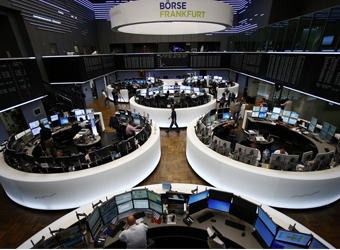The Nikkei 225 fell 1.7 percent in Tokyo, paring steeper losses of more than 2 percent seen earlier. The broader Topix was down 1.49 percent. All but one of its 33 subindexes were in negative territory, with mining sector stocks particularly downbeat.
Over in Seoul, the benchmark Kospi slid 1.35 percent as technology stocks mostly followed the lead from the overnight declines in U.S. tech. Samsung Electronics fell 2.48 percent, although SK Hynix reversed early losses to edge up by 0.37 percent.
Automakers and manufacturing stocks bucked the broader fall to put in a mixed performance, with Kia Motors rising 2.99 percent and Samsung Heavy tacking on 0.25 percent.
Hong Kong’s Hang Seng Index lost 1.47 percent, with the tech sector the biggest loser. Shares of index heavyweight Tencent fell 3.24 percent and AAC Technologies lost 4.94 percent.
On the mainland, the Shanghai composite declined 1.11 percent and the Shenzhen composite edged down by 0.76 percent. The ChiNext start-up board, however, bucked the trend to carve out gains, inching higher by 0.09 percent.
Down Under, the S&P/ASX 200 edged down 0.67 percent as all but three of its subindexes traded lower. Among sectors, consumer discretionary, materials and gold producers recorded declines of more than 1 percent, while the heavily weighted financials subindex eased 0.72 percent.
Losses in the region came after all three major U.S. indexes closed lower, despite notching gains earlier in the session, as technology stocks weighed on the broader markets. The drop in large cap tech names saw the Nasdaq composite fall 2.93 percent to close at 7,008.81.
Facebook shares tumbled after Bank of America Merrill Lynch cut its price target on the stock for the second time in five days. Other tech favorites, including Amazon, Netflix and Alphabet, also fell sharply.
Apart from tech sector troubles, trade-related issues returned to the spotlight as investors focused on a Bloomberg News report that the Trump administration was considering using an existing emergency law to limit Chinese investment in technologies regarded as sensitive.
While the report wasn’t exactly “new news,” given the Trump administration’s recent move to block a proposed Broadcom-Qualcomm deal on national security concerns, it was “enough for investors to become defensive again,” David de Garis, director of economics at National Australia Bank, said in a morning note.
Still, the overnight declines were not indicative of the broader economy, Colin Graham, CIO of multi-asset solutions at Eastspring Investments said.
“I think that the tech stocks had become detached from what’s going on in the real economy … But, for us, the underlying economy is still fine. We’ve seen some weakness in some of the survey data, but they’re coming from very high levels,” Graham told CNBC’s “Capital Connection.”
Stocks in Asia and Europe had bounced in the last session after U.S. and Chinese officials made conciliatory comments on Monday that suggested there could be some positive developments on trade.
In individual stocks, shares of Hong Kong-listed BYD Company sank 9.97 percent after the company reported Tuesday that its full-year profit declined 19.5 percent. It also said first-quarter net profit was expected to be pressured after a reduction in new energy vehicle subsidies.
Meanwhile, SoftBank Group and Saudi Arabia announced on Wednesday they were developing the world’s largest solar power generation project, which is expected to cost $200 billion through 2030.
In currencies, the dollar index, which tracks the greenback against a basket of currencies, held onto overnight gains to trade at 89.252 at 12:10 p.m. HK/SIN. The index had touched a five-week low in the overnight session.
Against the yen, the dollar firmed to trade at 105.49.
On the commodities front, oil prices extended losses after edging lower overnight. U.S. West Texas Intermediate crude futures slipped 0.77 percent to trade at $64.75 per barrel and Brent crude futures declined 0.63 percent to trade at $69.67.
The economic calendar for Wednesday is light on data, although the Bank of Thailand’s monetary policy meeting takes place today. Markets are not expecting changes in the central bank’s policy.
Source: CNBC


